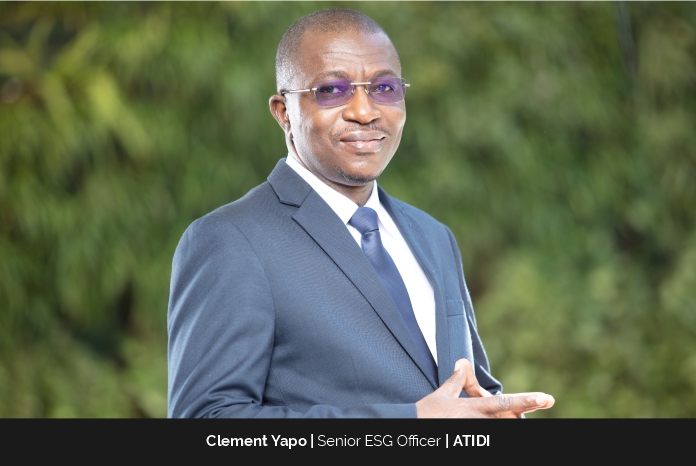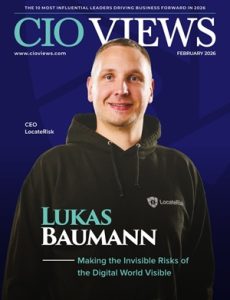Within the dynamic field of corporate sustainability, individuals like Clement Yapo are in charge of driving transformative change. Much like a skilled tightrope walker balancing on a high wire, Yapo navigates a complex terrain, balancing profit with purpose. As the Senior ESG Officer at ATIDI, Africa’s leading development insurer, his role is akin to a corporate conscience, requiring a delicate touch and a deep understanding of ethical business practices. Clement’s journey leading ESG initiatives underscores the growing influence of diverse voices in shaping the future of business. His leadership serves as a potent reminder that sustainable success is not just about financial gains but also about positively impacting society and the planet, a mission he has wholeheartedly embraced.
As the saying goes, ‘Rome wasn’t built in a day.’ Every success story is a testament to perseverance, dedication, and countless hours of hard work. Clement’s journey is no exception. When asked to share the path that led him to his current role as the Senior ESG Officer at ATIDI and what inspired his career in Environmental, Social, and Governance (ESG) advocacy and leadership, Clement recounts a life-altering experience that began in 1999.
It all started with his leadership role in one of the first ISO 14001 Environmental Management System certifications in West Africa for SCB – Groupe Société Fruitière, a leading French agricultural company with operations in Côte d’Ivoire, Ghana, Cameroon, and Senegal. Clement describes, “This was a remarkable experience as we were essentially building the systems from scratch.” Witnessing the transformation from the initial state to the positive impacts achieved after implementing the standard was a revelation for him. It underscored the profound benefits of effectively addressing environmental and social issues—not only in streamlining operations but also in promoting sustainable development. This critical experience ignited Clement’s passion for ESG advocacy and leadership. After dedicating many years to this initial role, he decided in 2014 to pursue an international career, eager to share his expertise on a broader scale.
Join us in exploring the rest of his fascinating saga as he articulately narrates each chapter that led him to where he has reached today.
Significant Pivots
Fanning his drive for ESG, Clement joined ENVAL, a consultancy firm where he played a crucial role in supporting environmental and social assessments for complex projects across various African countries. His journey continued with the Economic Community of West African States (ECOWAS), where he was based at the West African Health Organization (WAHO). Here, he contributed to various World Bank-funded projects spanning the fifteen ECOWAS countries.
Clement’s journey brought him to ATIDI in 2021, where he currently holds the position of Senior ESG Officer. He shares that he serves “with the objective of strengthening the consideration of ESG issues when supporting transactions in Africa.”
A recognized leader in the field, Clement’s recent recognition as one of “Africa’s 10 Most Influential Business Leaders, 2024” underlines his substantial impact on the industry. His academic background is equally impressive. He holds a postgraduate degree in Environmental Management from ESIP Poitiers (France) and the FHB Polytechnic Institute in Yamoussoukro (Côte d’Ivoire). Clement’s credentials are further bolstered by various certifications, including a Program for Management Development (PMD) from MDE Business School in Abidjan (Côte d’Ivoire) and IESE Business School in Barcelona (Spain), a Lead Auditor certificate in Environmental Management from the Institute of Environmental Management and Assessment (IEMA), and a Project Management Professional (PMP) certificate from the Project Management Institute (PMI).
The Professional Hazards
Clement’s early career was a perilous expedition into the uncharted territory of ESG, where the stakes were as high as the mountains and the rewards as elusive as a mythical treasure. He found himself traversing the corporate maze, where sustainability was often a distant dream, overshadowed by the immediate demands of profit and productivity.
At SCB, he encountered a particularly daunting obstacle while implementing environmental standards. Despite the corporate initiative, the implementation process proved to be arduous. The challenge lay securing management support across the organization’s twelve production sites for sustainable agricultural practices. This required convincing management to abandon effective but environmentally harmful chemicals in favor of safer alternatives, even at the risk of crop damage. Additionally, revisions to chemical application methods and timelines posed the threat of reduced production.
To address these challenges, Clement and his team adopted a strategic approach. They prioritized effective stakeholder engagement and enhanced communication, emphasizing the proposed changes’ benefits and drawbacks. Understanding the full scope of the transformation was crucial to garnering buy-in from all parties involved.
The Imperative Role of ESG in Modern Business and Sustainable Development
Clement argues that ESG guidelines have emerged as a cornerstone for responsible corporate behavior in today’s cutthroat business world. For him, sustainability and ethical practices are no longer mere buzzwords but essential drivers of success. He considers that as global challenges like climate change, social inequality, and ethical concerns intensify, ESG factors have become central in decision-making, from policy formulation to investment strategies.
He reminds about the pressing importance of ESG practices in ensuring that businesses not only achieve financial success but also contribute positively to society and the environment. By proactively identifying and addressing environmental, social, and governance risks, companies can mitigate potential liabilities, enhance their reputation, and foster long-term sustainability.
Clement adds: “ESG guidelines also ensure regulatory compliance, improve access to capital, and offer a competitive edge, as socially conscious investors increasingly use ESG criteria to evaluate potential investments.”
According to him, aligned with the UN 2030 Agenda for Sustainable Development, these guidelines provide a framework for businesses to contribute to a more equitable and sustainable future.
ATIDI’s ESG Integration: A Formalized Commitment
According to Clement, the organization’s recent formalization of its ESG policy in July 2023 represents a significant milestone. This policy, approved by the Board of Directors, reflects ATIDI’s longstanding dedication to building its business around solid ESG criteria, dating back to its inception in 2001.
To ensure that ESG considerations are integrated into every aspect of its operations, ATIDI has implemented a rigorous screening and classification process for proposed transactions. Clement explains that this process categorizes transactions based on their ESG risk profile: category A (High ESG risks), category B (medium ESG risks), and category C (Low ESG risks). By conducting thorough due diligence aligned with the IFC Performance Standard, ATIDI gains a deeper understanding of potential ESG risks and can develop targeted measures to mitigate them.
Furthermore, ongoing monitoring ensures that agreed-upon ESG measures and Environmental and Social Management Plans (ESMPs) are effectively implemented. By doing so, ATIDI aims to prioritize transactions with a positive developmental impact on the African continent while also addressing ESG risks, thereby increasing the focus on the developmental aspect of its investments. Clement informs, “The ESG Policy is officially disclosed and available on ATIDI’s website.”
Addressing Challenges in Integrating ESG at ATIDI
While ATIDI’s formal ESG policy represents a significant step forward, its implementation has not been without obstacles. Clement details the key challenges ATIDI has encountered in integrating Environmental, Social, and Governance (ESG) principles into its operations. One significant difficulty has been aligning ESG criteria with existing risk management practices. This task involves balancing immediate financial performance with long-term sustainability goals, all while accommodating the organization’s established business priorities. Integrating ESG criteria is complex, requiring customized strategies for each stage of the process.
To handle these challenges, at ATIDI, he and his team have focused on securing strong support from senior management and technical teams to embed ESG principles effectively. They have also actively engaged with partners to assess their needs and expectations, addressing any gaps through ongoing communication and capacity-building initiatives.
Clement’s Role in Integrating ESG at ATIDI
Clement’s leadership has been climactic in guiding ATIDI through its ESG integration process. Drawing on his extensive experience in ESG issues and stakeholder engagement, he has steered the complex task of embedding these principles into the organization’s operational framework. His role has involved not only setting strategic directions but also ensuring practical implementation across various levels of the organization.
Clement’s technique underscores the importance of patience and persistence in the ESG journey. He emphasizes that initial challenges often include a lack of support from stakeholders, which can impede progress. “I would add that in the ESG journey, patience is important because we can often be confronted in a first approach with a lack of support from stakeholders,” Clement explains. This insight reflects his belief in the necessity of allowing time for stakeholders to understand and embrace ESG changes fully. His strategy accentuates the importance of patience and investing in training, allowing people time to adapt. This senior officer stresses the need to be ready to adjust approaches based on feedback before trying again. This approach ensures a smoother transition and more effective integration of ESG principles at ATIDI.
A Defining Moment in ESG Leadership
Every leader’s journey is marked by pivotal moments that shape their path and define their legacy. These defining moments often involve overcoming significant challenges, making strategic decisions, or driving transformative initiatives. One such milestone for ATIDI’s Senior ESG Officer was successfully developing and validating the organization’s inaugural ESG policy and guidelines.
This achievement, endorsed by ATIDI’s Management and Board of Directors, was a testament to the organization’s commitment to sustainability. Despite ESG principles being deeply ingrained in ATIDI’s corporate culture, the process of formulating a comprehensive policy required a substantial investment of time and effort. The initiative involved extensive collaboration with internal and external stakeholders, meticulous attention to detail, and a resolve to balancing competing interests. Through a series of iterative refinements and rigorous evaluations, Clement and his team successfully waded through the complexity of the process, culminating in the Board’s unanimous approval of the ESG policy and guidelines. This landmark accomplishment symbolizes the team’s dedication and a notable feather in his cap.
Enhancing ESG Strategy Through Stakeholder Engagement
“Stakeholder engagement is critical to the success of any major change for an organization,” Clement comprehends. Their ESG strategy is built on a foundation of open communication and collaboration. As he explains, by reaching out to every individual and department impacted by ESG integration, ATIDI has gained invaluable insights into their concerns and aspirations. This two-way dialogue has strengthened relationships and paved the way for more effective expectation management. By keeping stakeholders in the loop, the organization has empowered them to play an active role in shaping its ESG journey and ensuring its ultimate success.
Shaping a Sustainable Future at ATIDI
Clement is resolute about ATIDI’s role in addressing climate change, a major global issue. With a clear vision for the organization’s ESG initiatives, he is steering ATIDI toward impactful environmental stewardship in Africa. He explains that ATIDI is in the process of formalizing its first climate change framework. These include training staff on climate change issues and encouraging sustainable practices in their daily routines. Additionally, ATIDI has conducted a survey to assess staff commuting habits and their potential impact on carbon footprint.
As a subject matter expert, he shares: “Our climate change framework, which will be approved in the coming months, will include a climate change policy, strategy, and action plan that will reinforce our commitment to building climate resilience for each project we support.”
Leave No One Behind: Clement’s ESG-Driven Vision for ATIDI and Africa
As an experienced professional in the field, Clement envisions a future where ESG is more than just a corporate Catchphrase; he sees it as a fundamental pillar of Africa’s economic development. According to him, as a multilateral institution tasked with facilitating investment and boosting trade in the continent, ATIDI recognizes the need to strengthen the sustainability of its operations.
By embedding ESG principles into its core functions, the organization will promote a sustainable and inclusive business environment. This involves rigorously evaluating projects through an ESG lens, ensuring they positively impact social, environmental, and governance standards.
Clement asserts that ATIDI’s commitment to sustainable development aligns with global efforts to achieve Africa’s Sustainable Development Goals (SDGs). He emphasizes that the guiding principle for all initiatives will be to “leave no one behind.” By prioritizing projects that benefit marginalized communities and promote equitable growth, ATIDI aims to make a meaningful difference in the lives of millions.





